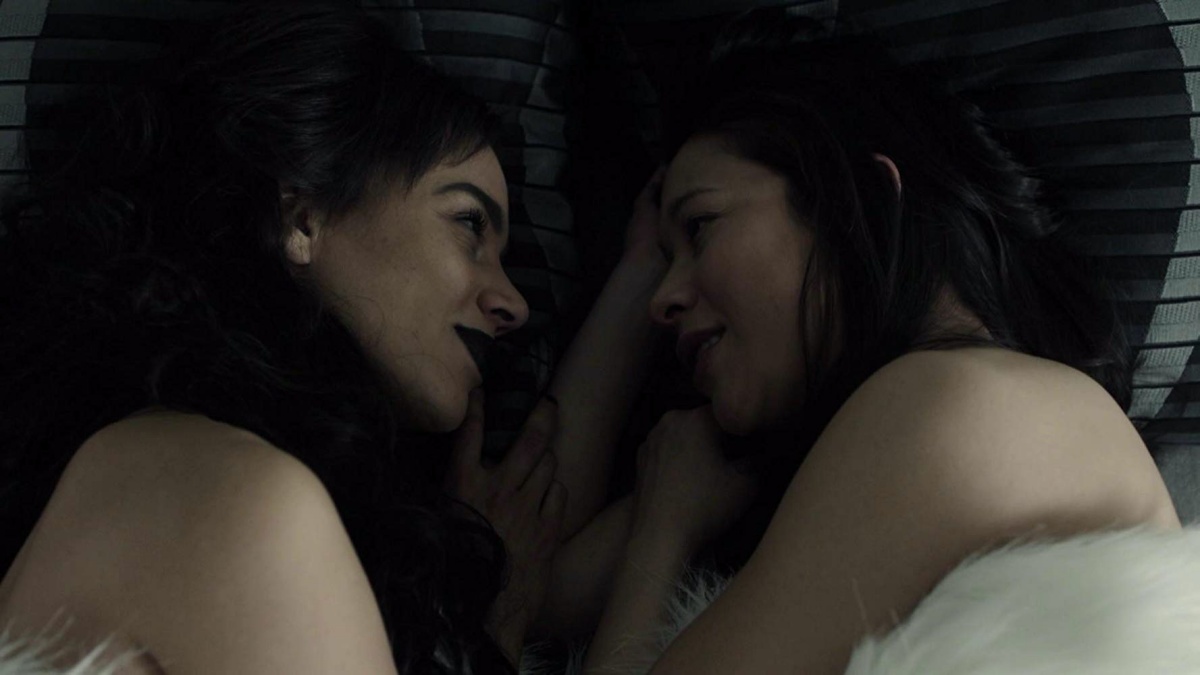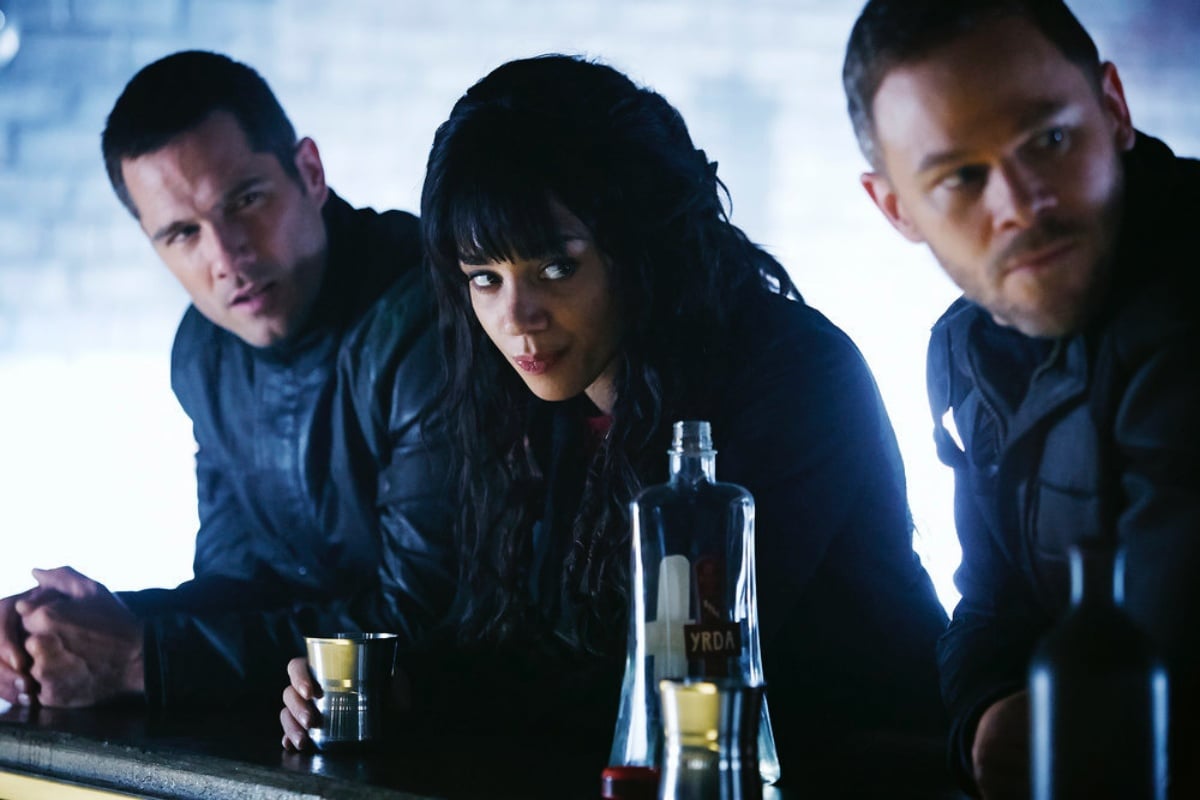I was lucky enough to be arriving into by bisexuality around the time when bisexual and other queer content was becoming the norm in genre television that I love. I got to have Lost Girl, Orphan Black, Doctor Who, and then, in 2015, I got something that went a little bit further for me: Killjoys.
Created by Michelle Lovretta, Killjoys was a Canadian-American science fiction series that ran for five seasons (2015 to 2019) and starred Hannah John-Kamen (Ant-Man and The Wasp), Aaron Ashmore (Smallville), and Luke Macfarlane (Brothers & Sisters), as three reclamation agents who become embedded in alien politics, space colonization, and super assassins. It’s a living.
Yalena “Dutch” Yardeen (Hannah John-Kamen) is our hero, a high-level RAC agent whose mysterious past ties her into a lot of the alien shenanigans. Her father, Khlyen, was emotionally and physically abusive because training your child to be an assassin is just not something that can leave a person undamaged.
Dutch’s best friend and heart of the team is Johnny Jaqobis (Aaron Ashmore), and Johnny’s older brother D’avin (Luke Macfarlane) joins them, and a lot of their work is unpacking their own issues, from abusive parents to PTSD. At the core, the strength of Killjoys is that as the world expands, what the show really always centers on are the themes of found family, tackling abuse, fighting injustice, and surprisingly, the idea that redemption is possible if people are given a chance.
Throughout the show, there are many times you think it will fully dip into the typical stereotypes concerning scifi, but Killjoys never wastes an opportunity to be subversive. With Johnny and Dutch’s friendship, it never makes that awkward turn into the romantic, but it is always shown to be the most important relationship in the series. They are a family, and that is a bond that is even more important than romance.
It’s frankly refreshing, and it allows Johnny to have his own emotional journeys. He is the “heart” of the team and the smart guy, but he is also a romantic in his own way. That is never used against him or to demean him, and that ability to be empathetic serves the team just as much as D’avin and Dutch’s fighting skills.
D’avin was very much a surprise to me as a character, because at first he just seems like the aloof, angry older brother, but the series really shows the emotional trauma he suffered as a kid that followed him into adulthood. From their father beating the crap of him to being turned into a military puppet, D’avin has a lot of PTSD, and it has forced him to push down a lot of the kindness and gentleness that is inherent to him.
As the series progresses, you see that D’avin is a caretaker by nature, able to read people well emotionally, and will always put others before himself. Also, you get to see him get treatment for his PTSD and make steps toward recovery!
Then, of course, there is Dutch. Hannah John-Kamen does an amazing job with this character and Dutch’s “twin” Aneela, who shows up later in the series. It’s already rare to see Black women as the leads in the series (especially back in 2015, after all Sleepy Hollow put us through), but Dutch is unequivocally the lead, the hero, the ace of this team. She never feels expendable, and the story always allows her to be flawed in her thinking and grow from her experiences.
My biggest concern with Dutch was that she was going to be stuck in this low-key sexist “cool girl” space that is typical in the genre. There can only be one cool woman, but thankfully, Dutch’s internalized sexism gets addressed, and the show rounds the cast out with compelling female characters like Pawter, Delle Seyah, and Zephyr, among others.
Dutch’s “coolness” is also called out for what it is: the result of abuse. She wasn’t born an assassin; she was turned into one and raised by someone who believed that the best way to help her was to hurt her. That warps your idea of love, and throughout the show, especially with her friendship with Johnny, she is able to heal from that mentality.
The world is also populated with plenty of queer characters—good guys, villains, morally ambiguous … it’s all around. Pree (Thom Allison) holds it down for a long time as a former warlord turned bartender, but we quickly get Delle Seyah, Aneela, Gared, and you could even read Dutch herself as bi/pansexual.

There is also a refreshing amount of diversity, and while I still wish there were more darker-skinned characters on the show, I appreciated that we did have plenty of Black and Asian characters with meaty roles that got to do interesting things and be more than just background. Sean Baek as Fancy Lee was absolutely one of my favorite parts of the series simply because that was a character who could have been easily put to the side because he was cocky, but he got to keep coming back and be effortlessly cool.
Oh, and I’d be remiss if I forgot about Lucy, a ship that snarks and picks favorites even though it shouldn’t be able to do that—we stan.
If I had any criticism of the series, I’d say that the first season, much like most space opera shows, is a little weak in comparison to the others. It’s with the second season that we really get into the interesting and unique aspects of the series. There are absolutely good episodes in the first season, and I wouldn’t say it’s equivalent to, like, the first season of Buffy, but it’s more like the fifth season of Charmed—good stuff going on, but feels like it’s just finding it’s footing.
When we talk about shows in the post-Buffy the Vampire Slayer world, there is no denying that the template that Whedon started helped launch a bunch of series that tried to follow that influence. A lot fail because they forget that there has to be a heart at the center of the series—that things might be hell, but when you have a family to come home to, that matters. Killjoys knew how to bring the snark, the world-building, and the heart together in one fun package. And it never killed off its Black lead, even when she was busy, which may seem like a low bar, but man would you be surprised.
(images: SyFy)
Want more stories like this? Become a subscriber and support the site!
—The Mary Sue has a strict comment policy that forbids, but is not limited to, personal insults toward anyone, hate speech, and trolling.—










Published: Mar 11, 2020 12:33 pm